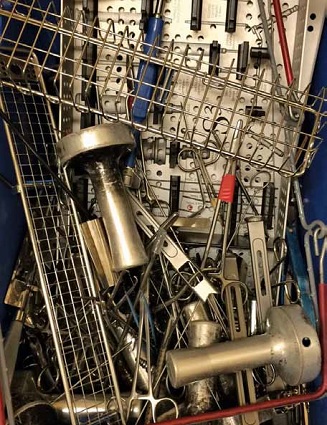Metal recycling in healthcare waste management
Read about a metal recycling trial that took place in Ninewells Hospital, Scotland.
Over recent years, many of us will have noted the ever-increasing electricity bill, thought about installing loft insulation or started separating waste at home. There's increasing recognition that we should be making an attempt to be more environmentally friendly at work too.
Not unsurprisingly, the NHS produces 4% of all UK waste, and one-third of this is from peri-operative areas. It's thought at least 40% of anaesthetic waste could be reclassified as domestic waste or recycled.
Our trial looked at the potential for recycling single-use metal items which are frequently used in theatres. Examples include forceps, laryngoscopes and scissors.
Following use, these items have traditionally been deposited into sharps containers which are then incinerated and sent to landfill.

This disposal route has a significant economic and environmental impact. As an alternative, we postulated that single-use metal items could be collected in a reusable container, appropriately treated and then recycled. This would hopefully reduce costs and carbon footprint.
Trial planning and staff education
Our trial started with a period of logistical planning and staff education. We then deployed specific reusable recycling containers in locations within our theatre complexes for use over a 6-week period.
At the time our hospital had 23 theatres producing appropriate waste. Locations included specific theatres (e.g. ophthalmology, paediatrics) plus recovery areas. Once full, these containers were transferred to larger 770 litre bins.
The bins were transported to a local treatment plant and then to another company for analysis and recycling. After the initial two weeks, the Sterile Services department (dealing with defective and old instruments) also joined in the project.
Over the project period, 0.14 tonnes of metal were saved from incineration from theatres and 0.23 tonnes from Sterile Services. Extrapolating that over a year, we would estimate saving approximately 1.18 tonnes from theatres and 3.04 tonnes from Sterile Services.
It's been predicted that recycling 1 tonne of anaesthetic metal waste equates to saving 1480 kg of carbon emissions. Therefore, our carbon emission savings from theatres over a year would equate to approximately 1746 kg.
Furthermore, we would reduce the use of plastic sharps containers and their contribution to incineration weight (estimated at 0.21 tonnes annually). Disposal of full sharps containers in our health board currently costs £467 per tonne so this would represent ongoing savings.
In addition, there would be further savings from rebate on recycled metal, which varies with market value. Our project definitely demonstrated a sustainable solution for the disposal of metal single-use items from theatres. It may be that other hospital departments could also contribute to the waste stream. We are delighted that other health boards in Scotland have been trialling and implementing similar strategies since our project originally started. We acknowledge Health Facilities Scotland for their funding, and the Healthcare Environmental Group for their input.
Written by:
- Amy Sadler - ST5 Anaesthetics, East of Scotland
- Philip Wilde - Property Environmental Quality Manager, NHS Tayside
- Pavan Raju - Consultant Anaesthetist, Ninewells Hospital
- Grant Rodney - Consultant Anaesthetist, Ninewells Hospital
This article first appeared in the May 2018 edition of Anaesthesia News.